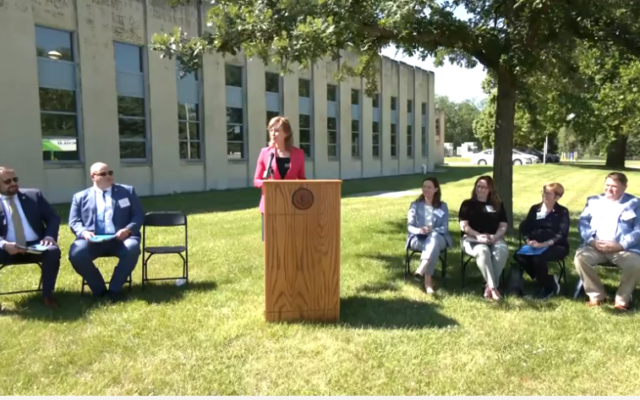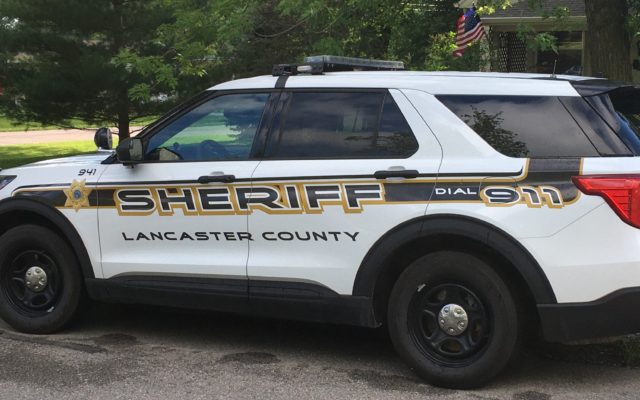City Launches Efforts to Secure Second Water Source

Lincoln, NE (June 28, 2022) Mayor Leirion Gaylor Baird today announced that the City of Lincoln will conduct a comprehensive study to determine the best solution for Lincoln’s long-term water needs. She also announced the formation of the Mayor’s Water Source Advisory Council, a group of community and business leaders who will advise the City’s efforts to identify and secure a second source of water – a project called “Water 2.0: Securing Lincoln’s Second Source.”
While current projections and plans indicate that Lincoln has adequate water supply for the next 26 years, Mayor Gaylor Baird underscored the need to begin planning now to ensure that the Lincoln Water System has the capacity to meet the demand of a growing city.
“This effort will be the largest and singularly most important public works project for Lincoln’s growth, health, and vitality into the future,” Mayor Gaylor Baird said. “Identifying and securing a second source of water will strengthen our economic and environmental resilience for decades to come.”
The Mayor’s Water Source Advisory Council will be chaired by Susan Seacrest, the founder and former President of the Nebraska Groundwater Foundation.
“We have an important legacy of care in Lincoln; for our shared stories, for children and youth, and for the precious natural resources, like water, that nurture and protect,” Seacrest said. “Together, along with many experts, we will study, collaborate, and innovate, using the technology, expertise, and state-of-the art science we need to move forward. Working together, we can and will understand and appreciate our water, commit to its protection, and safeguard it for our children.”
State Senator Eliot Bostar will serve as Vice Chair. The Mayor said he and State Senator Anna Wishart have worked hard to support the project through the legislative session and will continue to help secure funding for the design, construction, and implementation of water transport infrastructure in the future. The City’s next step is to apply to the Nebraska Department of Natural Resources to request $20 million in American Rescue Plan Act funding.
“Our community must have clean water to drink, even in times of drought or emergency,” said Senator Bostar. “We need to build more resiliency and redundancy into our infrastructure to make sure that the City of Lincoln doesn’t run out of water as we continue to grow, and the $20 million allocated by the state legislature will help us start the process of securing a second source of our most critical resource.”
“Ensuring Lincolnites have access to a safe and sustainable drinking water source is and will continue to be a priority of mine as a Nebraska State Senator,” Senator Wishart said. “Our legislature took an important step this past session with the appropriation of $20 million to support Lincoln’s securing of a second water source.”
Liz Elliott, the Director of the Lincoln Transportation and Utilities Department (LTU), will serve as City Lead. She said Lincoln Water System manages its water quantity and quality year-round.
“There are no days off when it comes to supplying the Earth’s most desired natural resource to our community,” Elliott said. “Our team members guarantee adequate water supply every day. Water conservation, plumbing innovations, new technology, regulations, and greater awareness all play positive roles that contribute to the success of our growing system. Our customers use 34% less water today than in the 1980s. Lincoln Water System has also increased its summer capacity by more than 30% over the last 10 years by adding wells. Now it is time for the next step. As our community grows, our system must grow with it.”
Elliott said the first step is to conduct an alternatives analysis. Olsson has been contracted to help the City and the Mayor’s Water Source Advisory Council navigate complex design, construction, financial, legal, and governance options. The analysis is scheduled to be completed early next year. The analysis will cost about $3.1 million. Elliott said the total cost of establishing a second water source will range between $350 million and $750 million.
“Lincoln Water System has a long history of delivering safe, clean, high quality drinking water to our residents,” Elliott said. “We take to heart our responsibility for the health and wellbeing of everyone who calls Lincoln home. The alternatives analysis represents our steadfast commitment to sound policy, best practices, and modern engineering principles to inform our decisions about the future of water supply for Lincoln.”
The Lincoln City Council will be represented on the Advisory Council by members Tom Beckius and Richard Meginnis, and the Lancaster County Board will be represented by member Sean Flowerday.
“Securing a second water source is a challenging task that will take innovation, careful planning, and grit,” said Beckius. “I am proud to be a member of the Mayor’s Water Source Advisory Council, as this important group will lead as the public’s voice and offer valuable guidance and thorough discussion throughout the process.”
“Growing up in Lincoln, my father taught my brothers and me the value of water at an early age,” said Meginnis. “He would take us to Lincoln Water System where he showed us the water plant my grandfather designed. Together, we would marvel at the large amounts of water being filtered into the building. Fast forward to adulthood, and my good friend, mentor, and past Lincoln City Councilman Joe Hampton always said passing a bond to expand Lincoln Water System in the late 1970s was one of his biggest accomplishments. This effort has stuck with me for many years. Now, as a City Councilman myself, and a member of the Mayor’s Water Source Advisory Council, it is our turn to offer input and help lay the foundation to add a second water source to Lincoln. This effort will directly impact the city’s long-term future and surrounding area. Beginning this effort now will ensure our future generations receive the same high-quality water as we enjoy today.”
“Today, I join the Mayor’s Water Source Advisory Council, a public advisory group, to represent Lancaster County as the City of Lincoln begins its historic journey to secure a second water source,” said Flowerday. “This project is important to not just this local community but so many more. Lancaster County, nearby towns, villages, rural Nebraska, surrounding areas, and counties have the potential to see economic and water security benefits from this project. I am here to be a part of the conversation. To listen, learn, and advise.”
More information on the project will be available at lincoln.ne.gov/water.






